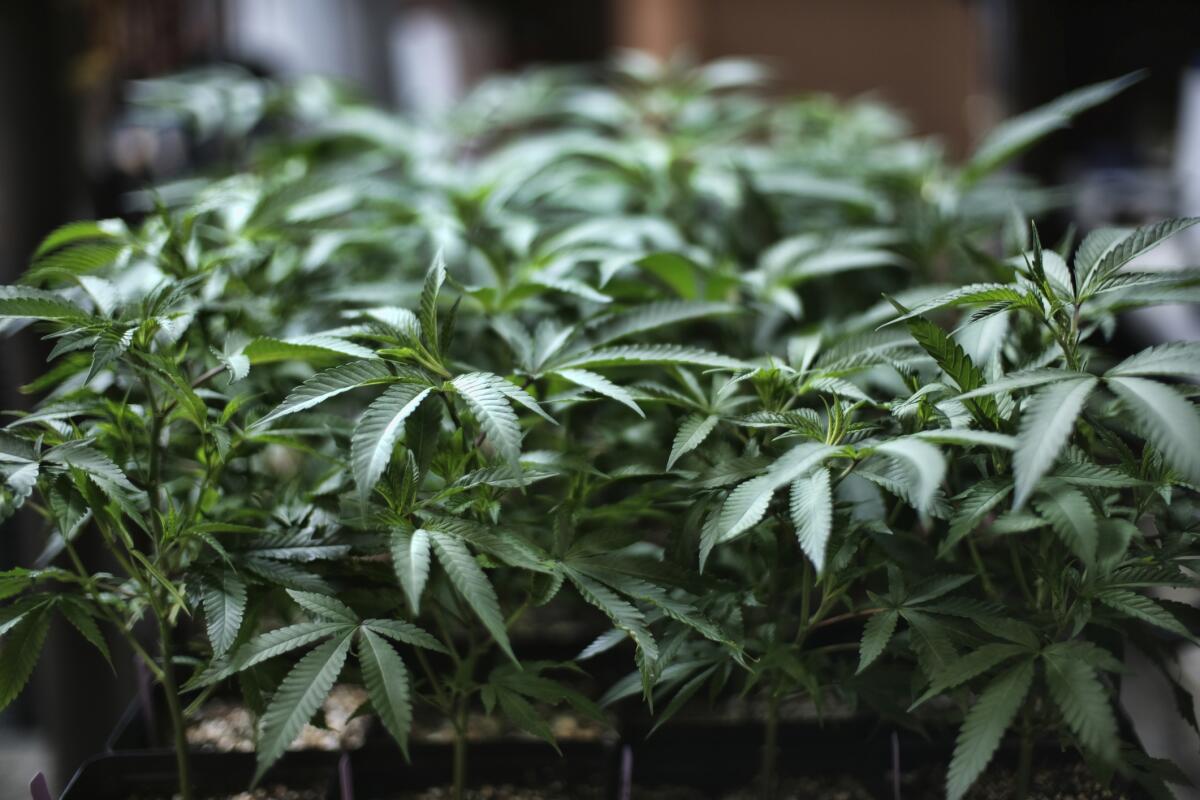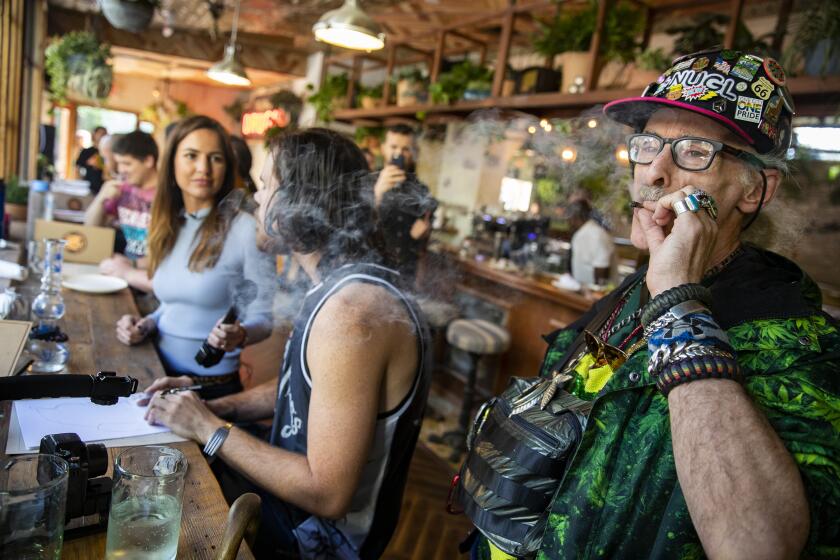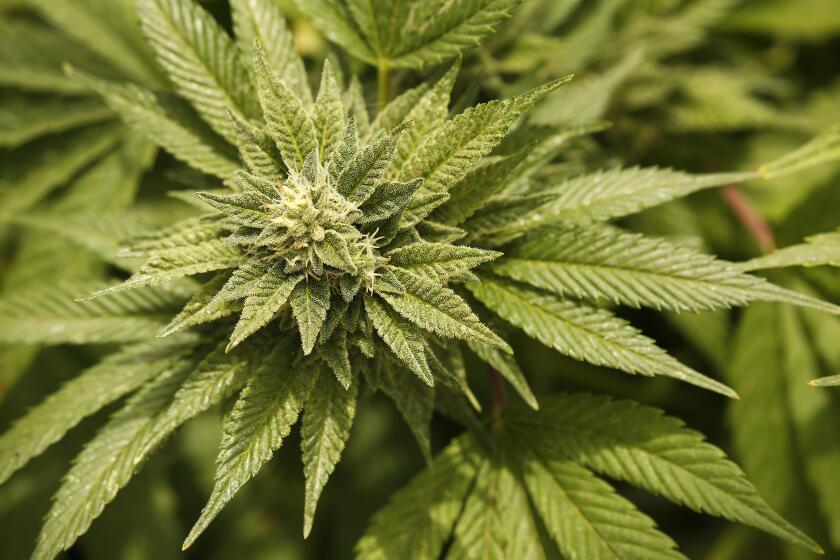Editorial: Are state fair officials high? They should not reward super-potent marijuana

- Share via
Cannabis is making its debut at the California State Fair in July, taking its place among chardonnays, craft brews, tomato salsas, pickled peppers and satsuma marmalades as a product of the state’s agricultural bounty.
Don’t expect to see contest judges getting stoned in a booth between the popcorn and the piglets, though. Marijuana will be judged in a highly scientific competition, with licensed growers sending their weed to a lab that analyzes the plants for several chemical compounds associated with flavor and aroma, as well as mental and physical effects. Growers are submitting samples through the end of this month, and in May, gold and silver medals and trophies will be awarded in 11 categories.
It may seem surprising that a plant still categorized as an illegal drug by the federal government is featured at a state-sanctioned event. But California voters made cannabis legal for adults in 2016, so it’s reasonable for pot farmers to showcase their goods at the state’s annual agriculture celebration.
What isn’t reasonable is a contest category that recognizes the pot with the highest concentration of the acid form of THC, the ingredient that produces a high when it’s smoked, vaped, baked or otherwise heated. Health officials are raising alarms, and the state fair’s board of directors ought to listen to them.
Pot sold in flower form today is already much more potent than it was decades ago — average THC concentration shot up from about 4% in 1995 to 17% in 2017. (Some cannabis products, like extracts and oils, can be even more concentrated, though they are not included at the state fair.) Meanwhile, research shows that use of super-potent weed is associated with problems such as psychosis, anxiety and vomiting. The mental health risks are especially high for teens and young adults whose brains are still forming.
The promise of Proposition 64 remains largely unfulfilled five years after passage. California is an example of how not to legalize marijuana.
The potential danger of powerful pot was the main reason the Legislative Analyst’s Office recommended that California tax legal cannabis based on its potency. A higher tax on more potent products could discourage harmful use, the nonpartisan analyst argued. Lawmakers never acted on the suggestion.
Now, state officials seem to be going even further by tacitly encouraging legal growers to boost THC content in their cannabis plants. Winners of the state fair’s marijuana awards will get increased publicity, special logos to put on packaging and social media promotion.
Which has health officials screaming: Are you high?
Contest organizers point out that the competition is limited to marijuana plants — not the edibles, extracts or other products they can be turned into. And they claim that by competing for the concentration of THCa (the acid form of the chemical compound) they are not promoting the ingredient that creates a high. Doctors say this distinction is irrelevant, though, because THCa becomes THC when it’s smoked or otherwise heated.
The competition will “lead people to believe that the ‘best’ cannabis products are simply the ones with the highest concentrations,” the California Conference of Local Health Officers wrote in a letter to the chair of the state fair’s board of directors last year. The group is made up of doctors who oversee public health in cities and counties across the state.
“This framing is likely to result in inappropriate and unhealthy views of cannabis and to exacerbate the public-health concerns around its use,” it wrote.
Jellies, jams and weed will all be competing at the 2022 California State Fair. When it comes to judging the plants, no one will inhale.
Can’t you just imagine cannabis brands boasting about their gold medals to advertise the most potent pot — probably on billboards that teenagers will see?
The state fair also hosts competitions for wine and beer, but it does not give out medals for concoctions containing the most alcohol. In fact, the wine competition includes categories for low- and no-alcohol wines.
Californians voted to legalize marijuana with a vision of treating pot more like alcohol — as a tightly regulated product for adults. Since then, the legal marketplace has struggled to compete with the black market. To the extent a cannabis competition at the state fair can help bolster the legal industry, it should not be shunned. The state fair’s current plan includes responsible measures like restricting the cannabis exhibit to age 21 and over.
But Gov. Gavin Newsom, who campaigned for marijuana legalization and serves as an ex-officio member of the state fair’s board of directors, has a special obligation to ensure that California balances support for the legal industry with what’s best for public health — and that should include responsible messaging about legal marijuana. He and the rest of the board should reconsider the contest category encouraging growers to develop more potent strains of pot when existing research demonstrates their dangers.
More to Read
A cure for the common opinion
Get thought-provoking perspectives with our weekly newsletter.
You may occasionally receive promotional content from the Los Angeles Times.












